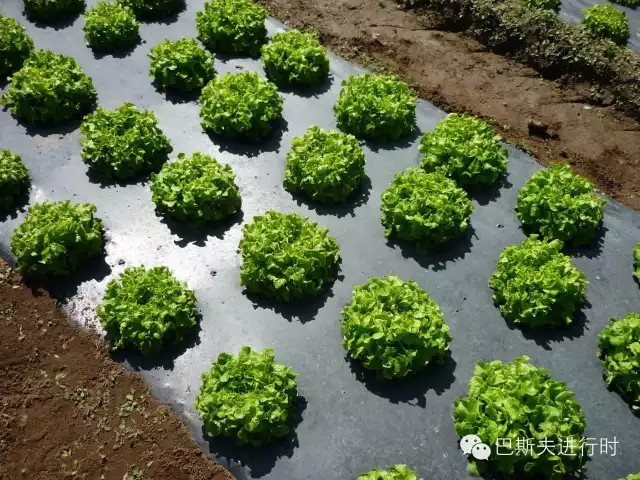The outstanding performance of BASF ecovio® biodegradable agricultural mulch in corn, tomato and potato cultivation, as well as breakthroughs in cotton field applications. Ecovio® biodegradable plastic film has excellent mechanical properties, thermal insulation and water retention properties as well as good UV resistance . Compared with traditional PE film, it can not only ensure crop yield, but also will not cause soil pollution. In the past few years, BASF has worked closely with stakeholders such as the China Plastics Processing Industry Association, the Chinese Academy of Agricultural Sciences, the National Agricultural Technology Extension Service Center and the Xinjiang Cotton Association to promote the use of biodegradable agricultural plastic film to promote sustainable agricultural development. , and has conducted experiments in Yunnan, Shandong, Jiangxi and Inner Mongolia. The end of 2014, BASF is cooperating with the local partner of Xinjiang Production and Construction Corps in Xinjiang Uygur Autonomous Region launched the largest ever ecovio® film experimental field projects with a total area of 1,700 acres. Sustainable Development of Agriculture in China Globally Xinjiang is the largest cotton planting area in China, and the cotton planting area accounts for more than half of the area's agricultural area. China's cotton planting area accounts for only 15% of the world's total, while cotton production is as high as nearly 30%. Mu yield is 85% higher than the world average. Xinjiang's cotton fields all require the use of plastic film. In 2014, the use of plastic film in China was approximately 1.42 million tons. Due to the widespread use of ultra-thin plastic film and the lack of residual film recovery technologies and mechanisms, the recovery rate of plastic film in China is less than two-thirds. “China is the world’s largest cotton producer and one of the three largest tomato producers and processors in the world, and Xinjiang is the largest cotton and tomato planting region in China. Therefore, sustainable agriculture in Xinjiang and the world’s sustainable textiles and The food supply chain plays a pivotal role,†said Zheng Daqing, senior vice president of BASF Greater China. “ BASF is eager to contribute to the protection of soil in Xinjiang and the country .†The huge cost of ordinary PE film: pollution of farmland soil, affecting the growth of crops As of 2014, Xinjiang used more than 47 million mu of farmland for plastic film, accounting for nearly one-seventh of the country's use of plastic film. Agricultural technicians found that after more than 30 years of extensive use of PE plastic film, their residues have not attracted enough attention, resulting in serious contamination of cotton fields in local areas and have begun to affect agricultural production. Professor Yan Changrong of the Chinese Academy of Agricultural Sciences stated: “The mulching technology has also caused a series of pollution hazards while significantly increasing the yield of crops. Since the main component of common mulching film is polyethylene (PE), it is extremely difficult to decompose in soil and it is extremely thin. The application of plastic film, the recovery technology and the backwardness of machine tools have led to a low recovery rate of the plastic film, which has exacerbated the pollution. A large number of plastic film residues in the soil have destroyed the soil structure, impeded the movement of soil moisture and nutrients, and affected crop growth.†The results of relevant studies in the Xinjiang region also show that plastic film residues have affected the emergence rate of cotton and thus affected cotton production. “The mulching of plastic film has made a great contribution to ensuring the safety of agricultural products in China. At the same time, residual film contamination has become a major challenge for us. In order to ensure the sustainable development of agriculture, we must accelerate the research on the prevention and control technology of farmland mulching film residues . Extend the promotion of standard mulch, and use mechanized recovery methods to control the further increase of residual film contamination. On the other hand, we should strengthen the research of biodegradable plastic film, use biodegradable plastic film instead of common mulch film, and control the occurrence of residual mulching film from the source.†Professor Yan Changrong added. “A lot of experts are aware that the ultra-thin PE film is too thin to be recovered, and the accumulated amount of residual film is very large every year, affecting the emergence or the death of the seedlings. Our current data say that PE film per acre. The residue is between 16 and 28 kg. If we do nothing at the moment, then it means that the accumulation of residual film pollution will cause a loss of production," said Lu Jun. Many mulches are buried under the soil, and some can even become pieces that cannot be cleaned manually because of decay. Farmers have to spend a considerable amount of time cleaning up the remaining membranes. However, as the size of the debris becomes smaller year by year, these clean-up efforts have had little effect. Although the government supports the use of thicker plastic films that are easier to clean, farmers believe that thick plastic films are expensive and time consuming. Mu corn, 200 acres of sugar beets, 200 acres of potatoes, 200 acres of pumpkins and 5 acres of tomatoes. The experimental results show that the film produced with ecovio® is superior to traditional products, especially in harsh environments . “In Xinjiang, the growth period of cotton is longer. It requires a slightly longer lytic period for biodegradable membranes, which should be more than 90 days.†said Lu Jun, director of the Institute of Agricultural Environment and Sustainable Development at the Shihezi Agricultural Research Institute. . (For details, please refer to: ) 30Pcs Shoe Wet Wipe,30Pcs Shoe Kleenex Wipes,30Pcs Shoe Wet Tissue Wipes,30Pcs Shoe Wetwipe DONGYANG COMEXA SANITARY PRODUCTDS LTD.,CO , https://www.comexawetwipes.com

BASF's ecovio® biodegradable plastic film helps China's soil protection
Window._bd_share_config={"common":{"bdSnsKey":{},"bdText":"","bdMini":"2","bdMiniList":false,"bdPic":"","bdStyle":" 0","bdSize":"32"},"share":{},"image":{"viewList":["qzone","tsina","tqq","renren","weixin"], "viewText":"Share to:","viewSize":"16"},"selectShare":{"bdContainerClass":null,"bdSelectMiniList":["qzone","tsina","tqq","renren" ,"weixin"]}};with(document)0[(getElementsByTagName('head')[0]||body).appendChild(createElement('script')).src='http://bdimg.share. Baidu.com/static/api/js/share.js?v=89860593.js?cdnversion='+~(-new Date()/36e5)];